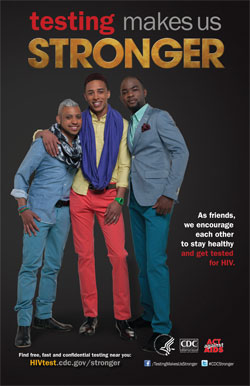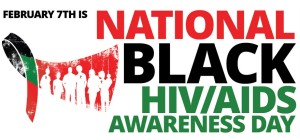Throughout my time in healthcare education and advocacy, particularly when working with LGBT people and people of color, I have heard so many heartbreaking stories about HIV/AIDS. Living in fear, losing friends and family, lack of information about and access to care – the specter of this disease looms large, particularly over those underserved communities. I remember watching Marlon Riggs’ “Ethnic Notions” in college and then being devastated to learn that we had lost this powerful and talented voice to the AIDS epidemic. This disease has taken far too many of our friends, family members, heroes, and compatriots.
I am very grateful, then, for the annual National Black HIV/AIDS Awareness Day on February 7th, which puts the spotlight on supporting those in the Black community living with HIV/AIDS and preventing new cases from occurring. This year, the theme for the day is “I am My Brother’s Keeper,” invoking the metaphor of mutual support we provide to those we look out for in our families — a notion which also informs President Obama’s “My Brother’s Keeper Initiative” to support young Black men and other men of color.
The numbers are chilling. By the end of 2008, an estimated 260,800 Blacks with an AIDS diagnosis had died in the US since the disease first struck in 1981. At some point in their lifetimes, 1 in 16 Black men will be diagnosed with HIV infection, as will 1 in 32 Black women. There are striking disparities, too: the AIDS diagnosis rate for Black men (103.6) was the highest of any group, followed by Latino men (45.5), and Black women (38.1). By comparison, the rate among white men was 8.7. The rate of new infections is also highest among Blacks and was 7 times greater than the rate among whites in 2006.
What does that mean for our diverse elders? Research estimates predict that 50 percent of people with HIV in the U.S. will be age 50 and older by 2015—and by 2020, more than 70 percent of Americans with HIV are expected to 50 and older. Recognizing that the HIV/AIDS epidemic has disproportionately affected communities of color and LGBT people since its beginning, the Diverse Elders Coalition recently released an original policy brief, Eight Policy Recommendations for Improving the Health and Wellness of Older Adults with HIV, which you can download, read, and share.
 We are similarly encouraging older Black Americans with HIV/AIDS – and everyone – to #SignUpB4TimesUp and get covered by the ACA. In 2014, its first year of providing new coverage, the ACA has seen dramatic positive results, with more than 9 million fewer uninsured, including many with HIV. The second round of enrollment for health care coverage in the Marketplace under the ACA is active until February 15. Until that deadline, new participants can get covered, and people currently receiving coverage can make adjustments to their health care plans.
We are similarly encouraging older Black Americans with HIV/AIDS – and everyone – to #SignUpB4TimesUp and get covered by the ACA. In 2014, its first year of providing new coverage, the ACA has seen dramatic positive results, with more than 9 million fewer uninsured, including many with HIV. The second round of enrollment for health care coverage in the Marketplace under the ACA is active until February 15. Until that deadline, new participants can get covered, and people currently receiving coverage can make adjustments to their health care plans.
You can also find a National Black HIV/AIDS Awareness Day event in your community to attend or volunteer. Hundreds of sites around the country are offering free testing, film screenings, panel discussions, and other opportunities to commemorate those Black Americans we’ve lost to HIV/AIDS and acknowledge those working tirelessly to end this epidemic. This February 7th, and every day, remember: we are our brothers’ (and sisters’!) keepers.


